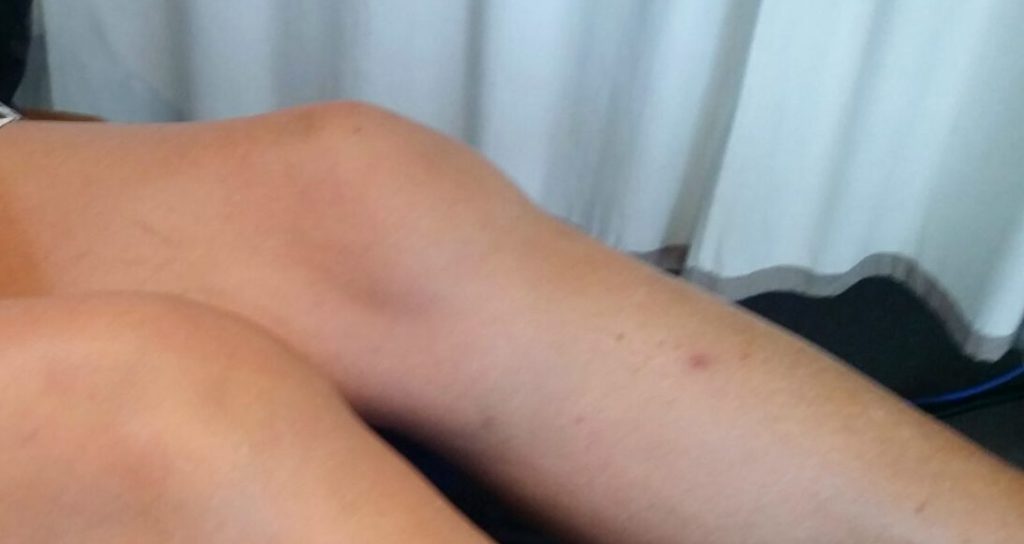A meniscus tear is a common knee injury that can prevent normal knee function.
The meniscus is a rubbery, C-shaped disc that cushions your knee and keeps your knee steady by balancing your weight across the knee. Tears can lead to pain and/or swelling of the knee joint. Especially acute injuries (typically in younger, more active patients) can lead to displaced tears which can cause mechanical symptoms such as clicking, catching, or locking during motion of the knee joint.
What is a meniscus?
The knee joint is formed by your thigh bone (femur) and the larger bone in your lower leg (tibia). Between these bones (inside the knee joint) are two rounded discs of cartilage. One is referred to as the medial (inside) meniscus, and the other the lateral (outside) meniscus.
Each meniscus acts as a shock absorber cushioning impact in the knee during weight-bearing activity, such as walking/ running/ jumping.
Injuries to the meniscus are very common, and are sometimes referred to as torn cartilage in the knee. Medial (inner) meniscal injuries are more common than lateral (outer) meniscal injuries.
What causes a meniscus tear?
Injuries to the meniscus can occur traumatically (e.g. during sport) but they often also occur over time through gradual wear and tear associated with overuse.
A meniscus tear is usually caused by twisting or turning quickly, often with the foot planted while the knee is bent. These tears can occur when you lift something heavy or play sports.
What are the symptoms of a meniscus injury?
The severity of symptoms can vary considerably depending on the severity of the damage to the meniscus. Some common signs and symptoms include;
- Sudden, sharp pain at the inner/ outer aspect, front or back of the knee at the time of injury.
- Audible sound at the time of injury or experienced a tearing sensation.
Swelling is often present and may occur a few hours after injury or, more commonly, in the following days. - There is usually pain with weight bearing activity and twisting movements of the knee, but when there is no load the pain goes often away.
- Pain when climbing stairs, attempting to kneel or when squatting.
- Tenderness may also be experienced on firmly touching the knee joint at the inner/ outer aspect of the knee.
- The knee may also feel weak or unstable and may click, lock or give way during certain movements.
In minor cases of meniscus tears there may be little or no immediate symptoms. In these cases, symptoms may develop gradually over the coming days.
How are meniscal injuries diagnosed?
A physical examination by one of our physiotherapists is usually sufficient to diagnose a meniscal injury.
Investigations such as X-ray and MRI are sometimes used to diagnosis and exclude the presence of other injuries to the knee.
Treatment of a meniscal injury
In the case of a suspected meniscal injury to the knee, people should follow the R.I.C.E regime for the first 48-72 hours.
Minor tears to a meniscus may heal with rest and appropriate rehabilitation. Treatment will involve a combination of hands-on therapy, a structured rehabilitation program and a gradual return to sport. Bracing or immobilisation is generally not appropriate for meniscal injures.
Despite appropriate physiotherapy management, the menisci (plural of meniscus) do not generally have a good blood supply and a reasonable percentage of minor meniscal tears fail to improve. In this case, surgery may be required for an optimal outcome. The majority of large meniscal tears also require surgery. This is particularly true in those cases where the knee is ‘locked’. Surgery for meniscus tears is minimally invasive.
For minor meniscus tears that are managed conservatively can usually expect to return to sport or activity in approximately 2 – 4 weeks. For moderate tears that are managed conservatively return to sport or activity may take 4 – 6 weeks or longer.
Minor meniscus tears that are managed surgically can often return to sport or activity within 4 – 6 weeks, although most surgical repairs (especially when the meniscus tear is moderate to severe) will usually require a rehabilitation period of 6 – 8 weeks.
For more information regarding management and rehabilitation of meniscus injuries of the knee contact one of the physiotherapists at Jubilee Sports Physiotherapy.






















